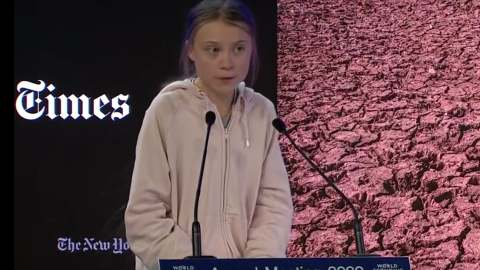Greta Thunberg at Davos: 3 straw-man arguments from Twitter & YouTube comments

CBS News
- On Tuesday, Thunberg gave a speech at an event in Davos, Switzerland.
- She mainly spoke about the failure of world leaders to act on climate change.
- Also speaking at Davos was President Donald Trump, who didn't mention Thunberg by name, but dismissed the "prophets of doom" who are calling for increased climate change policies.
Greta Thunberg, the 17-year-old Swedish climate activist, spoke on Tuesday at an event hosted by The New York Times and the World Economic Forum in Davos, Switzerland. As world leaders in business, politics and industry gathered in the small ski town to discuss the future of the global economy, Thunberg gave a speech criticizing these same leaders for failing to act on climate change.
“We demand at this year’s World Economic Forum, participants from all companies, banks, institutions and governments: Immediately halt all investments in fossil fuel exploration and extraction,” she said. “Immediately end all fossil fuel subsidies. And immediately and completely divest from fossil fuels. We don’t want these things done by 2050, 2030, or even 2021. We want this done now.”
You can watch her full speech below.
Immediately after her speech went online, commenters on YouTube and Twitter began criticizing Thunberg. That wasn’t surprising. Thunberg has been a target of conservative criticism even since making her now-famous “How dare you” speech at a United Nations climate summit in September 2019. President Donald Trump has also joined in, tweeting that the young activist needs to “chill” and go see a “good old fashioned movie with a friend!”
On social media and YouTube, you’re likely to run into a few common critiques of Thunberg. Here are three that deserve a closer look.

‘Young people aren’t really willing to make sacrifices’
There are a few common critiques of Thunberg in this comment: 1) Greta is all idealism without concrete pragmatic solutions; 2) the world needs to keep producing fossil fuel for power; 3) young people aren’t willing to make sacrifices to reduce emissions.
The first critique has some truth to it, while the second seems like a “there is no alternative” fallacy. But let’s focus on the third argument, which says that young people say they care about curbing climate change, but they aren’t actually willing to make the necessary sacrifices. Is that true?
A 2019 survey from The Washington Post and the Kaiser Family Foundation provides some clues. The results showed that:
- Almost two-thirds of teens who believe in human-caused climate change (55% of all teens) said they think they can help make a difference when it comes to reducing the effects of climate change.
- 41% say they’ve taken action to reduce their own carbon footprint.
- About 25% report engaging in some type of political action in the past 3 years to express their views on climate change, including 15% who say they’ve participated in a school walk-out, 13% who have participated in a protest or rally, and 12% who have contacted a government official.

Greta’s voyage across the Atlantic Ocean was hypocritical
To attend a United Nations climate summit in New York City on September 23rd, Thunberg sailed from England to the U.S. on an emissions-free sailboat called Malizia II. Thunberg, who has helped to promote the “flight shaming” movement, was criticized because several crew members scheduled international flights just to facilitate the voyage. The general thrust of arguments like these is that Thunberg is a hypocrite who’s unwilling to make the sacrifices she’s calling for, or at least that she’s naive to think she can operate in the modern world without leaving a carbon footprint.
Are these critics right to call out her supposed hypocrisy? Or is this a type of whataboutism that distracts from the core issue?
I’d argue that it is fair to call out Thunberg — if her lifestyle demonstrably doesn’t line up with what she’s preaching. After all, Thunberg is not only petitioning governments to do more on climate change, she’s also encouraging the shaming of people who book commercial flights. If she’s unwilling to make similar sacrifices, she should expected similar shame. What’s more, Thunberg’s personal environmental footprint is important for another reason, as Nives Dolsak and Aseem Prakash write for Forbes:
“…policy advocacy is effective if one walks the climate talk…The bottom line is that when people take personal responsibility, they begin to have skin in the game. Climate action becomes personal and it makes them more politically assertive in demanding policy changes.”
Still, Thunberg’s personal environmental footprint says absolutely nothing about the truthfulness of her claims about climate change. Thunberg, for example, could be a truck-driving, flight-booking environmental nightmare who makes it a point to leave the lights on wherever she goes, but that wouldn’t change the science on climate change one bit. In short, it’s worth considering potential hypocrisy, but it shouldn’t distract from the core argument.

Children shouldn’t lecture the public about climate change
Should the public be interested in what a teenager has to say about climate change? To answer that, you have to balance two key points. One is that Thunberg is a teenager who’s not a scientist and doesn’t have anything particularly novel to say about climate change or policies that might mitigate it. Climate science is complex. It takes years of study to understand the intricacies of how the climate works, and though scientists generally agree that human activity is warming the planet, they still have much to learn about the extent to which things like greenhouse gas emissions affect, say, storm patterns in the Caribbean.
Thunberg is not conducting such research. Rather, she takes research from climate scientists (mainly the Intergovernmental Panel on Climate Change), and uses her pretty impressive rhetorical abilities to animate the public, especially young people.
“Speaking as a climate change scientist who has been working on this issue for 20 years and saying the same thing for 20 years, she is getting people to listen, which we have failed to do,” Saleemul Huq, director of the International Centre for Climate Change & Development in Bangladesh, told NBC News. “I thought it was the most powerful speech I’ve ever seen.”
But even if Thunberg is getting people to care about an important issue, that doesn’t necessarily mean she’s doing it in a productive way. (For example, Thunberg has said, and reiterated at Davos, that she wants people to “panic” about climate change.) What’s more, it’s possible that she is over-relying on the projections of the IPCC, which doesn’t have a perfect track record.
Still, there’s another angle to the “she’s only a child” critique — one that has to do with the main stakeholders of the future of climate change. If mainstream predictions are correct, Thunberg and those her age are likely to suffer far more from the downstream consequences of climate change, compared to the industry leaders and policymakers working in 2020. Given that young people will inherit the world and societal structures that today’s policymakers build, it seems unfair to say that their opinions — even if underdeveloped, or based on emotion — count for nothing.





